人体部位和英语习语
- 格式:doc
- 大小:56.50 KB
- 文档页数:12
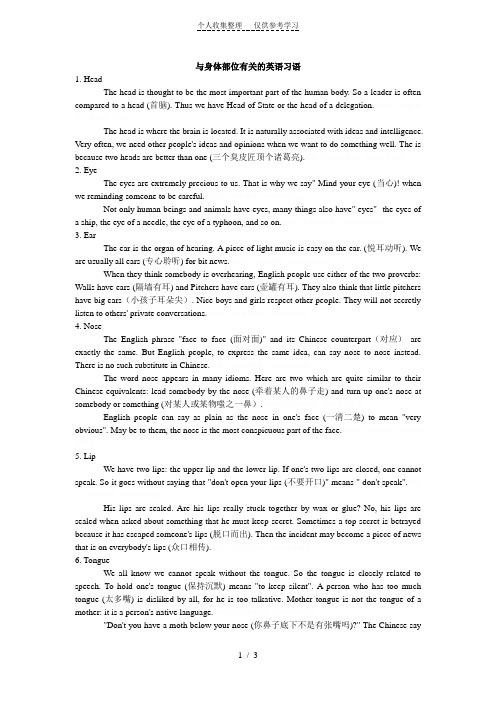
与身体部位有关的英语习语1. HeadThe head is thought to be the most important part of the human body. So a leader is often compared to a head (首脑). Thus we have Head of State or the head of a delegation.The head is where the brain is located. It is naturally associated with ideas and intelligence. Very often, we need other people's ideas and opinions when we want to do something well. The is because two heads are better than one (三个臭皮匠顶个诸葛亮).2. EyeThe eyes are extremely precious to us. That is why we say" Mind your eye (当心)! when we reminding someone to be careful.Not only human beings and animals have eyes, many things also have" eyes"- the eyes ofa ship, the eye of a needle, the eye of a typhoon, and so on.3. EarThe ear is the organ of hearing. A piece of light music is easy on the ear. (悦耳动听). We are usually all ears (专心聆听) for bit news.When they think somebody is overhearing, English people use either of the two proverbs: Walls have ears (隔墙有耳) and Pitchers have ears (壶罐有耳). They also think that little pitchers have big ears(小孩子耳朵尖). Nice boys and girls respect other people. They will not secretly listen to others' private conversations.4. NoseThe English phrase "face to face (面对面)" and its Chinese counterpart(对应)are exactly the same. But English people, to express the same idea, can say nose to nose instead. There is no such substitute in Chinese.The word nose appears in many idioms. Here are two which are quite similar to their Chinese equivalents: lead somebody by the nose (牵着某人的鼻子走) and turn up one's nose at somebody or something (对某人或某物嗤之一鼻).English people can say as plain as the nose in one's face (一清二楚) to mean "very obvious". May be to them, the nose is the most conspicuous part of the face.5. LipWe have two lips: the upper lip and the lower lip. If one's two lips are closed, one cannot speak. So it goes without saying that "don't open your lips (不要开口)" means " don't speak".His lips are sealed. Are his lips really stuck together by wax or glue? No, his lips are sealed when asked about something that he must keep secret. Sometimes a top secret is betrayed because it has escaped someone's lips (脱口而出). Then the incident may become a piece of news that is on everybody's lips (众口相传).6. TongueWe all know we cannot speak without the tongue. So the tongue is closely related to speech. To hold one's tongue (保持沉默) means "to keep silent". A person who has too much tongue (太多嘴) is disliked by all, for he is too talkative. Mother tongue is not the tongue of a mother: it is a person's native language."Don't you have a moth below your nose (你鼻子底下不是有张嘴吗)?" The Chinese sayso to blame a person who did not say what he should have said. But this not the right way to express the idea in English. English people would say, "You have a tongue in your head, haven't you?"7. FaceFace has to do with the idea of respect and dignity both in Chinese and English. You lose your face (丢面子) if you fail again and again, but a decisive victory will save your face (挽回面子) after all your failures.When you feel unhappy, you pull a long face (拉长脸). The idea is conveyed in Chinese in the same way. But "about face (向后转)" does not refer to the face. It is a military order to turn round and face in the opposite direction. It is the exact equivalent of " about turn".8. ShoulderThe shoulders can bear heavy things. Your father has a great responsibility for the family on his shoulder. When faced with difficulty, the family should stand shoulder to shoulder (肩并肩) to overcome it. You should not turn a cold shoulder (不理睬) to your family members. Nor should you give your friends the cold shoulder (冷落朋友). Both expressions mean treating others coldly.9. BackA good host is hospitable to his guests. But, if guest is tiresome, the host is glad to see his back (他离开).If your friend has done something really well, you may give him a pat on the back (轻轻拍背部) to show your appreciation.If you turn your back on somebody (不理睬他人), you mean you do not like making friends with that person.10. HeartThe heart is an extremely important organ inside the chest. It usually stands for something important or the centre of something, for example, the heart of the matter (问题的核心) or the heart of mystery.Many other expressions make use of the word heart. A lover can be called a sweet heart (情人). The Purple Heart (紫心徽章) is a medal given as an honor to American soldiers wounded in battle.If your friend is in trouble, you may encourage him by saying "Don't lose heart (不要灰心)."11. StomachThe stomach is naturally related to one's appetite. If you dislike heavy food, you have no stomach for it (反胃). The word is also related to one's interests or likings. If you find something boring or vulgar, you have no stomach for it, either. Bad food turns your stomach. Similarly, your stomach turns at a bad joke.Stomach can also be a verb. Look at this example: "How could you stomach (忍受) such rude words?" Apparently, stomach here can be replaced by "tolerate".12. ArmEvery person has two arms: the right arm and the left arm. The right arm is usually stronger, so we call a good helper the right arm (得力助手).We all know an arm is not very long. But when you keep someone at arm's length (保持距离), the distance is long enough. For that means you don not like that person and you try your best to avoid him or her. We should indeed keep the bad friends at arm's length.13. HandQuite a number of phrases formed form the word hand are very similar to their Chinese counterparts. Here are some obvious examples: a fresh hand (新手), short of hands (人手短缺), hand in hand (手拉手) and wash one's hands of something (洗手不干了). But do not always take this for granted. Study these examples and you will understand.He lives from hand to mouth (He has just enough money to live on). We gave them a big hand (We gave them lots of applause).14. FingerHow many fingers does each of your hands have? Now let's name them in English from the smallest: the little finger, the ring finger, the middle finger, the index finger and thumb.Each finger has its own part to play. If your fingers are all thumbs (笨拙), that is too bad. That means you are very clumsy.15. ThumbChinese people turn up their thumbs to express appreciation. English people do so to express not only appreciation but also approval. Chinese people never turn their thumbs down to mean anything. But English people do. They do so to show depreciation disapproval. Thus in English you can say, "We turn thumbs up (赞成) to Jack's suggestion but they turn thumbs down (不赞成) to it."Similarly, you can warmly praise someone by saying "Thumbs up (真棒)!" and show your dissatisfaction by saying "Thumbs down (差劲)!"16. SkinMost people will only think of the hair on our head when the word hair is mentioned. In fact, some animals and plants also have hair.A horrible scene may make a person's hair stand on end (毛骨悚然). But a courageous person will not turn a hair (不畏惧) even though he is in face of danger.Sometimes, a friend of yours may be so angry that he may act foolishly. Then you had better give him this advice: "Keep your hair on (别发脾气)".Selected from the book The Human Body by Huang Juanhua。
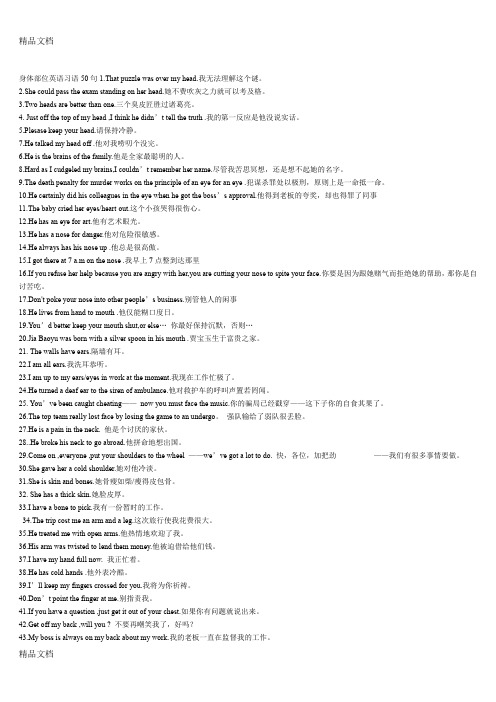
身体部位英语习语50句1.That puzzle was over my head.我无法理解这个谜。
2.She could pass the exam standing on her head.她不费吹灰之力就可以考及格。
3.Two heads are better than one.三个臭皮匠胜过诸葛亮。
4. Just off the top of my head ,I think he didn’t tell the truth .我的第一反应是他没说实话。
5.Plesase keep your head.请保持冷静。
7.He talked my head off .他对我唠叨个没完。
6.He is the brains of the family.他是全家最聪明的人。
8.Hard as I cudgeled my brains,I couldn’t remember her name.尽管我苦思冥想,还是想不起她的名字。
9.The death penalty for murder works on the principle of an eye for an eye .犯谋杀罪处以极刑,原则上是一命抵一命。
10.He certainly did his colleagues in the eye when he got the boss’s approval.他得到老板的夸奖,却也得罪了同事11.The baby cried her eyes/heart out.这个小孩哭得很伤心。
12.He has an eye for art.他有艺术眼光。
13.He has a nose for danger.他对危险很敏感。
14.He always has his nose up .他总是很高傲。
15.I got there at 7 a.m on the nose .我早上7点整到达那里16.If you refuse her help because you are angry with her,you are cutting your nose to spite your face.你要是因为跟她赌气而拒绝她的帮助,那你是自讨苦吃。
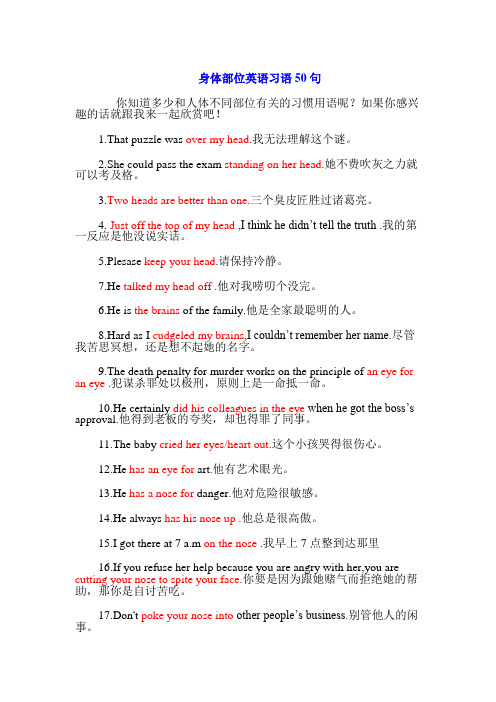
身体部位英语习语50句你知道多少和人体不同部位有关的习惯用语呢?如果你感兴趣的话就跟我来一起欣赏吧!1.That puzzle was over my head.我无法理解这个谜。
2.She could pass the exam standing on her head.她不费吹灰之力就可以考及格。
3.Two heads are better than one.三个臭皮匠胜过诸葛亮。
4. Just off the top of my head,I think he didn’t tell the truth .我的第一反应是他没说实话。
5.Plesase keep your head.请保持冷静。
7.He talked my head off .他对我唠叨个没完。
6.He is the brains of the family.他是全家最聪明的人。
8.Hard as I cudgeled my brains,I couldn’t remember her name.尽管我苦思冥想,还是想不起她的名字。
9.The death penalty for murder works on the principle of an eye for an eye .犯谋杀罪处以极刑,原则上是一命抵一命。
10.He certainly did his colleagues in the eye when he got the boss’s approval.他得到老板的夸奖,却也得罪了同事。
11.The baby cried her eyes/heart out.这个小孩哭得很伤心。
12.He has an eye for art.他有艺术眼光。
13.He has a nose for danger.他对危险很敏感。
14.He always has his nose up .他总是很高傲。
15.I got there at 7 a.m on the nose .我早上7点整到达那里16.If you refuse her help because you are angry with her,you are cutting your nose to spite your face.你要是因为跟她赌气而拒绝她的帮助,那你是自讨苦吃。
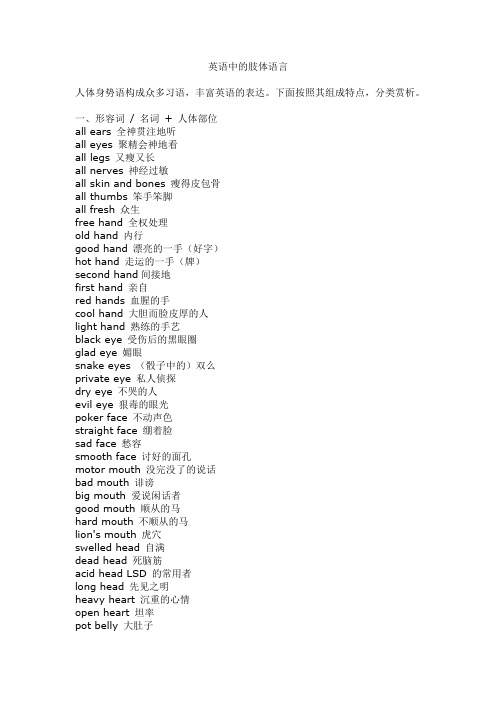
英语中的肢体语言人体身势语构成众多习语,丰富英语的表达。
下面按照其组成特点,分类赏析。
一、形容词/ 名词+ 人体部位all ears 全神贯注地听all eyes 聚精会神地看all legs 又瘦又长all nerves 神经过敏all skin and bones 瘦得皮包骨all thumbs 笨手笨脚all fresh 众生free hand 全权处理old hand 内行good hand 漂亮的一手(好字)hot hand 走运的一手(牌)second hand间接地first hand 亲自red hands 血腥的手cool hand 大胆而脸皮厚的人light hand 熟练的手艺black eye 受伤后的黑眼圈glad eye 媚眼snake eyes (骰子中的)双么private eye 私人侦探dry eye 不哭的人evil eye 狠毒的眼光poker face 不动声色straight face 绷着脸sad face 愁容smooth face 讨好的面孔motor mouth 没完没了的说话bad mouth 诽谤big mouth 爱说闲话者good mouth 顺从的马hard mouth 不顺从的马lion's mouth 虎穴swelled head 自满dead head 死脑筋acid head LSD 的常用者long head 先见之明heavy heart 沉重的心情open heart 坦率pot belly 大肚子stiff neck 顽固之人silver tongue 流利的口才mailed fist 暴力devil's bones 骰子loose lips 说话很随便cold shoulder 冷漠cold feet 胆怯green thumb 在园艺方面有才能的人Achilles heel 弱点busy body 管闲事者sweet tooth 爱吃甜食之人family skeleton 家丑二、人体部位+ 名词brain drain 人才外流brain trust 智囊团brain storm 突有灵感brain child 头脑的产物brain wave 计上心头tongue twister 绕口令face card 带人像的扑克牌face value 票面价值knee slipper 使人笑得拍大腿的笑话eye shot 视野bone shaker 老爷车skin dive 只戴眼罩的潜水skin game 赌博骗钱skull session 坐在一起动脑筋nose dive 一落千丈elbow grease 可施展之地chin music 聊天leg work 跑腿lip praise 表面的称赞lip service 空口的应酬话blood debt 血债belly laugh 捧腹大笑skin flick 色情电影三、动词+ 人体部位keep / save face 保全面子preserve face 保持面子maintain face 维护面子lose face 失去面子make faces 做鬼脸make mouths 对人做嘴脸make eyes 漫送秋波make head 前进count heads 点名knock head 叩头gather head 时机成熟change hands 易手join hands 携手联合kiss hands 吻君王之手hold hands 手搀手change foot 换步set foot 行走play footsie 情侣在桌底下碰脚rub elbow / shoulders 与人交往lose heart 沮丧take heart 鼓起勇气gain flesh 长肉lose flesh 消瘦tell noses 清点人数split hairs 作琐细的分析cut teeth 长牙give lip 讲硬话show leg 逃跑give / throw tongue 猫/狗狂吠shake hands 握手四、人体部位对称或并列face to face 面对面from ear to ear 开心limb to limb 肢解mouth to mouth 嘴对嘴heart to heart 交心shoulder to shoulder 齐头并进eye to eye 赞同eyeball to eyeball 面对面hand to hand 逼近head to head 交头接耳nose to nose 面对面back to back 背靠背hand in hand 手拉手arm in arm 挽臂neck and neck 并驾齐驱leg and leg 平分秋色side by side 肩并肩hand over hand 两手交叉使用from hand to hand 用手传递from mouth to mouth 口口相传from hand to mouth 勉强糊口from head to foot 全身from top to toe 从头到脚hand and foot 手脚一起;尽力heart and soul 全心全意tooth and nail 竭尽全力toe and heel 跳舞flesh and blood 人类head and ears 全身hand to fish 齐心协力hand over fist 多而快地赚钱hand over heels 倒栽葱tooth for tooth 以牙还牙eye for eye 以眼还眼五、人体部位在谚语的运用Two heads are better than one . 三个臭皮匠,胜似一个诸葛亮。
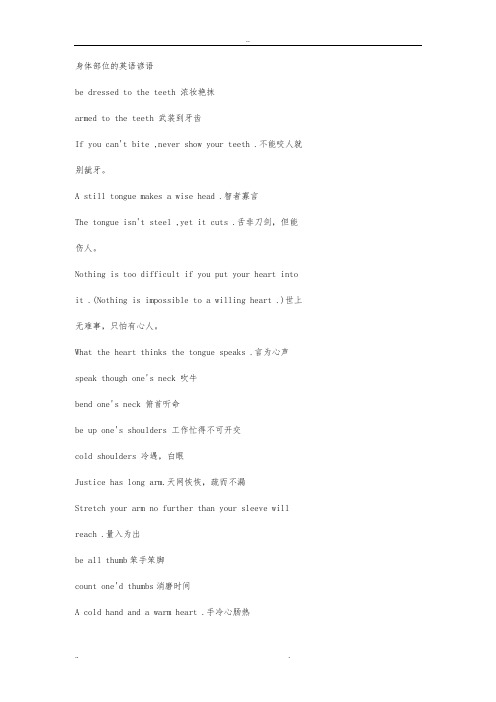
身体部位的英语谚语be dressed to the teeth 浓妆艳抹armed to the teeth 武装到牙齿If you can't bite ,never show your teeth .不能咬人就别龇牙。
A still tongue makes a wise head .智者寡言The tongue isn't steel ,yet it cuts .舌非刀剑,但能伤人。
Nothing is too difficult if you put your heart into it .(Nothing is impossible to a willing heart .)世上无难事,只怕有心人。
What the heart thinks the tongue speaks .言为心声speak though one's neck 吹牛bend one's neck 俯首听命be up one's shoulders 工作忙得不可开交cold shoulders 冷遇,白眼Justice has long arm.天网恢恢,疏而不漏Stretch your arm no further than your sleeve will reach .量入为出be all thumb笨手笨脚count one'd thumbs消磨时间A cold hand and a warm heart .手冷心肠热One hand washes another .有来有往;互相利用fall on one's leg逢凶化吉as fast as one'd legs can carry one 开足马力,拼命跑across one's knee(把小孩)脸朝下放在膝盖上打屁股beat sb to his knees打败某人have a foot in both camps脚踏两只船Better the foot slip than the tongue (Better to slip with the tongue )宁可失足,不可失言。
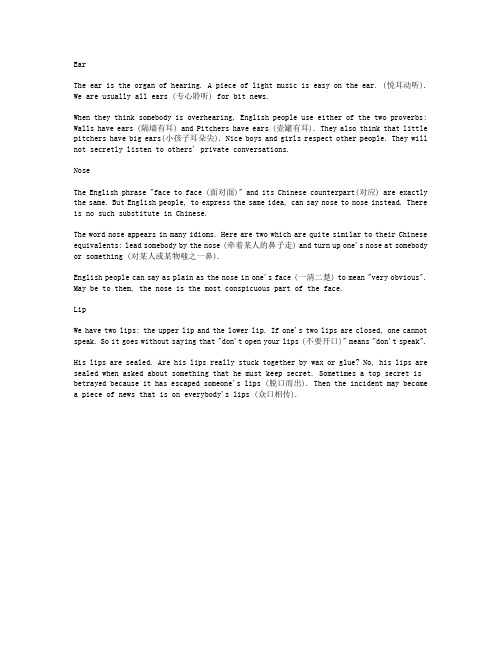
EarThe ear is the organ of hearing. A piece of light music is easy on the ear. (悦耳动听). We are usually all ears (专心聆听) for bit news.When they think somebody is overhearing, English people use either of the two proverbs: Walls have ears (隔墙有耳) and Pitchers have ears (壶罐有耳). They also think that little pitchers have big ears(小孩子耳朵尖). Nice boys and girls respect other people. They will not secretly listen to others' private conversations.NoseThe English phrase "face to face (面对面)" and its Chinese counterpart(对应) are exactly the same. But English people, to express the same idea, can say nose to nose instead. There is no such substitute in Chinese.The word nose appears in many idioms. Here are two which are quite similar to their Chinese equivalents: lead somebody by the nose (牵着某人的鼻子走) and turn up one's nose at somebody or something (对某人或某物嗤之一鼻).English people can say as plain as the nose in one's face (一清二楚) to mean "very obvious". May be to them, the nose is the most conspicuous part of the face.LipWe have two lips: the upper lip and the lower lip. If one's two lips are closed, one cannot speak. So it goes without saying that "don't open your lips (不要开口)" means "don't speak".His lips are sealed. Are his lips really stuck together by wax or glue? No, his lips are sealed when asked about something that he must keep secret. Sometimes a top secret is betrayed because it has escaped someone's lips (脱口而出). Then the incident may become a piece of news that is on everybody's lips (众口相传).。
英语习语-身体部位类五官篇a flea in one's ear 刺耳的话bite one's tongue 隐忍不言butter wouldn't melt in one's mouth acting as if innocent;being insincere button one's lip 不说话;保守秘密cry one's eyes out 痛哭流涕cut off one's nose to spite one's face 拿自己出气down in the mouth 神色沮丧feast one's eyes 大饱眼福foam at the mouth 暴怒gift of gab 伶牙俐齿have a loose tongue 口无遮拦have a word in one's ear 悄悄的说have one's ear to the ground 注意周围的动静have one's heart in one's mouth 提心吊胆have sth coming out of ones's ear 多得不得了in one's mind's eye 在想象中;在记忆中in the twinkling of an eye 眨眼间keep a stiff upper lip 遇到困难时坚定沉着keep one's eyes skinned 保持警惕keep one's nose clean avoid getting into trouble or doing anthing illegal keep one's nose to the grindstone 埋头苦干laugh out of the other side of one's mouth 转喜为忧lend an ear to someone 聆听look down one's nose at 看不起;不放在眼里make a pig's ear of sth 把事情办砸make eyes at somebody 向某人抛媚眼music to one's ears 好消息no skin off one's nose 不好影响某人not bat an eyelid 不动声色on the nose 恰好on the tip of one's tongue 差一点说出;差一点记起pay lip service to sth 嘴上说得好听pay through the nose 付过高代价prick uo one's ears 侧耳倾听see eye to eye 意见一致shoot one's mouth off 吹嘘;to tell secretssmile ear to ear 笑得非常开心stick in one's throat 难以说出口stick one's nose in sth 管闲事;干预throw dust in one's eyes 迷惑某人tongue in cheek 无诚意地;粉刺地turn a blind eye to sth 视而不见turn a deaf ear to sth 充耳不闻up to one's ears 深陷于wet behind the ears 乳臭未干win by a nose 险胜with a jaundiced eye 有偏见的with one's nose in the air 目中无人地四肢篇be rushed off one's feet 非常忙bite the hand that feeds one 恩将仇报bring someone to heel 使某人服从burn one's fingers 管闲事或做投机买卖吃亏chance one's arm 冒险一试cool one's heels 久候cost an arm and a leg 价格极其昂贵down at heel 处境穷苦elbow grease 苦干体力活fall head over heels in love with someone 疯狂迷上某人fall upon one's feet 化险为夷feet of clay 大人物的致命弱点foot the bill 买单get one's feet wet 初次做某事;开始做某事get the lead out (of one's feet)动作迅速give someone a hand 帮助a big hand 鼓掌give someone a leg up 帮某人一把grease one's palm 贿赂某人hand in glove 密切合作;相互勾结have cold feet 胆怯have one's hands full 忙得不可开交have the upper hand 处于有利位置head and shoulders above 远远超过hit the nai on the head 正中要害hold ... at arm's length 与...保持距离keep on one's toes keep one attentive, active, busy, or alert know ... like the back of one's hand 了如指掌live from hand to mouth 仅能糊口not have a leg to stand on 站不住脚on one's last legs 垂死;疲惫不堪pull one's leg 开玩笑put one's best foot forward 快点走;全力以赴;留下好印象put one's foot in one's mouth 讲话不得体put one's shoulder to the wheel 全力以赴rap someone over the knuckles 批评某人rub shoulders with someone 与有钱人、名人接触、来往shot in the arm 刺激物show one's hand 摊牌show the cloven foot 露马脚step on one's toes 伤害某人straight from the shoulder 直截了当地说take to one's heels 跑开throw in one's hand 放弃thumb a lift 搭便车thumb one's nose 蔑视twist someone around one's little finger 控制某人twist one's arm 强迫别人做不愿做的事under one's thumb 受某人支配work one's fingers to the bone 拼命工作其他a pat on the back 表扬、赞许的话或动作a slap in the face 羞辱;让人没面子的事情all skin and bones 皮包骨的bad blood 不好的情感be glad to see the back of someone 希望摆脱某人bone up on.. 刻苦用功读书by a hair's breadth 险些...cheek by jowl with 紧紧靠着地come to a head 到关键时刻cudgel one's brains 绞尽脑汁eat one's heart out 悲痛欲绝;嫉妒feel sth in one's bones 有强烈的直觉fly in the face of 公然违抗get it in the neck 受到惩罚get one by the short hairs 使某人就范get one's own back on someone 报复get sth off one's chest 一吐为快grit one's teeth 咬牙坚持have a frog in one's throat 声音嘶哑have a hunch 有预感have egg on one's face 丢脸have one's back to the wall 处境困难have one's head in the clouds 想入非非jump down one's throat 突然动怒;严厉斥责jump out of one's skin 大吃一惊keep a straight face 摆着脸keep body and soul together 勉强糊口keep one's head above water 避免陷入困境long in tooth 上了年纪的make a clean breast of sth 忏悔;招认make no bones about sth 直言不讳make old bones 长寿make one's blood boil 使某人大发雷霆make one's blood run cold 让人胆战心惊make one's hair stand on end 让人毛骨悚然neck or nothing 孤注一掷地not turn a hair 毫不惊慌off the top of one's head 毫无准备地pain in the neck 令人讨厌的事或人save one's skin 使安然无恙set one's teeth one edge 使某人感动不舒服split hairs 钻牛角尖stab one in the back 暗算;背叛stare someone in the face 就在眼前take one's breath away 令人惊叹take the bit between one's teeth 不受控制;下定决心做某事tooth and nail 竭尽全力地touch one's forelock 毕恭毕敬turn one's back on someone 拒绝帮助;不理会turn tail 掉头逃跑until one is blue in the face 极尽努力vent one's spleen 发泄怒气。
趣谈人体部位名词构成的习语在英语中经常会出现一些习惯用语、俚语、谚语及成语。
为了进一步了解外国人士交谈时所习惯用的语句。
增进对一般较为正式英语的理解水平,广泛的收集和使用英、美现代生活中流行的通俗习语是十分必要的。
以下是face , eye , foot, hand人体部位词构成的新颖趣味习语,并在一些习语中加以准确释义,附简明例句以说明用法。
1、Face1.1 Face (n.)脸是和汉语有较多共同点甚至有的直接是从汉语中译过来的,这是它的特殊方面。
脸部表情的表达:a long face 拉长了脸a straight face 一本正经的面孔a smooth face 光滑无须的脸;讨好或假意的脸a smiling face 笑脸a face like fiddle 无表情的脸从汉语中引进来的成语:lose face 丢脸save face 保全面子,面子就是人的自尊心。
make a face 做鬼脸show one's face 露面about face 向后转set one's face against 坚持反对fall flat one's face 一败涂地fly in the face of 公然反对put a bold face on it 若无其事keep a straight face 一本正经face和介词in搭配:laugh in sb's face 当面地公开地蔑视某人fly in the face of 公然反对look sb. in the face 直视某人stare sb. in the face 近在没眉捷,盯着看slap sb. in the face 打人耳光,比喻侮辱人例:I don't want to slap them in the face by not coming to their party.我不想不参加他们的聚会,伤他们的心。
有关人体身体部位的英文谚语习语身体部位的英语谚语be dressed to the teeth 浓妆艳抹armed to the teeth 武装到牙齿If you can't bite ,never show your teeth .不能咬人就别龇牙。
A still tongue makes a wise head .智者寡言The tongue isn't steel ,yet it cuts .舌非刀剑,但能伤人。
Nothing is too difficult if you put your heart intoit .(Nothing is impossible to a willing heart .)世上无难事,只怕有心人。
What the heart thinks the tongue speaks .言为心声speak though one's neck 吹牛bend one's neck 俯首听命be up one's shoulders 工作忙得不可开交cold shoulders 冷遇,白眼Justice has long arm.天网恢恢,疏而不漏Stretch your arm no further than your sleeve will reach .量入为出be all thumb笨手笨脚count one'd thumbs消磨时间A cold hand and a warm heart .手冷心肠热One hand washes another .有来有往;互相利用fall on one's leg逢凶化吉as fast as one'd legs can carry one 开足马力,拼命跑across one's knee(把小孩)脸朝下放在膝盖上打屁股beat sb to his knees 打败某人have a foot in both camps脚踏两只船Better the foot slip than the tongue (Better to slipwith the tongue )宁可失足,不可失言。
---------------------------------------------------------------最新资料推荐------------------------------------------------------人体部位和英语习语1. Head The head is thought to be the most important part of the human body. So a leader is often compared to a head (首脑). Thus we have Head of State or the head of a delegation. The head is where the brain is located. It is naturally associated with ideas and intelligence. Very often, we need other people’s ideas and opinions when we want to do something well. The is because two heads are better than one (三个臭皮匠顶个诸葛亮). 2. Eye The eyes are extremely precious to us. That is why we say Mind your eye (当心)! when we reminding someone to be careful. Not only human beings and animals have eyes, many things also have eyes- the eyes of a ship, the eye of a needle, the eye of a typhoon, and so on. 3. Ear The earis the organ of hearing. A piece of light music is easy on the ear. (悦耳动听). We are usually all ears (专心聆听) for bit news. When they think somebody is overhearing, English people use either of the two proverbs: Walls have ears (隔墙有耳) and Pitchers have ears (壶罐有耳尖) . Nice boys and girls respect other people. They will not secretly listen to others’ private conversations. ). They also think that little pitchers have big ears(小孩子耳朵4. Nose The English phrase face to face1 / 12(面对面) and its Chinese counterpart(对应) are exactly the same. But English people, to express the same idea, can say nose to nose instead. There is no such substitute in Chinese. The word nose appears in many idioms. Here are two which are quite similar to their Chinese equivalents: lead somebody by the nose (牵着某人的鼻子走) and tur n up one’s nose at somebody or something (对某人或某物嗤之一鼻) . English people can say as plain as the nose in one’s face (一清二楚) to mean very obvious. May be to them, the nose is the most conspicuous part of the face. 5. Lip We have two lips: the upper lip and the lower lip. If one’s two lips are closed, one cannot speak. So it goes without saying that don’t open your lips (不要开口) means don’t speak. His lips are sealed. Are his lips really stuck together by wax or glue? No, his lips are sealed when asked about something that he must keep secret. Sometimes a top secret is betrayed because it has escaped someone’s lips (脱口而出). Then the incident may become a piece of news that is on everybody’s lips (众口相传). 6. Tongue We all know we cannot speak without the tongue. So the tongue is closely related to speech. To hold one’s tongue ( 保持沉默 ) means to keep silent. A person who has too much tongue ( 太多嘴) is disliked by all, for he is too talkative. Mother tongue is not---------------------------------------------------------------最新资料推荐------------------------------------------------------ the tongue of a mother: it is a person’s native language. Don’t you have a moth below your nose (你鼻子底下不是有张嘴吗 )? The Chinese say so to blame a person who did not say what he should have said. But this not the right way to express the idea in English. English people would say, You have a tongue in your h ead, haven’t you? 7. Face Face has to do with the idea of respect and dignity both in Chinese and English. You lose your face ( 丢面子 ) if you fail again and again, but a decisive victory will save your face ( 挽回面子) after all your failures. When you feel unhappy, you pull a long face (拉长脸转) does not refer to the face. It is a military order to turn round and face in the opposite direction. It is the exact equivalent of about turn. ). The idea is conveyed in Chinese in the same way. But about face (向后8. Shoulder The shoulders can bear heavy things. Your father has a great responsibility for the family on his shoulder. When faced with difficulty, the family should stand shoulder to shoulder (肩并肩) to overcome it. You should not turn a cold shoulder (不理睬友). Both expressions mean treating others coldly. 9. Back ) to your family members. Nor should you give your friends the cold shoulder (冷落朋A good host is hospitable to his guests. But,3 / 12if guest is tiresome, the host is glad to see his back (他离开). If your friend has done something really well, you may give him a pat on the back ( 轻轻拍背部) to show your appreciation. If you turn your back on somebody (不理睬他人), you mean you do not like making friends with that person. 10. Heart The heart is an extremely important organ inside the chest. It usually stands for something important or the centre of something, for example, the heart of the matter (问题的核心) or the heart of mystery. Many other expressions make use of the word heart. A lover can be called a sweet heart (情人章) is a medal given as an honor to American soldiers wounded in battle. If your friend is in trouble, you may encourage him by saying Don’t lose heart (不要灰心). 11. Stomach ). The Purple Heart (紫心徽The stomach is naturally related to one’s appetite. If you dislike heavy food, you have no stomach for it (反胃). The word is also related to one’s interests or likings. If you find something boring or vulgar, you have no stomach for it, either. Bad food turns your stomach. Similarly, your stomach turns at a bad joke. Stomach can also be a verb. Look at this example: How could you stomach (忍受) such rude words? Apparently, stomach here can be replaced by tolerate.12. Arm Every person has two arms: the right arm and the left---------------------------------------------------------------最新资料推荐------------------------------------------------------ arm. The right arm is usually stronger, so we call a good helper the right arm (得力助手). We all know an arm is not very long. But when you keep someone at arm’s length (保持距离 ), the distance is long enough. For that means you don not like that person and you try your best to avoid him or her. We should indeed keep the bad friends at arm’s length. 13. Hand Quite a number of phrases formed form the word hand are very similar to their Chinese counterparts. Here are some obvious examples: a fresh hand (新手), short of hands (人手短缺了). But do not always take this for granted. Study these examples and you will understand. He lives from hand to mouth (He has just enough money to live on). We gave them a big hand (W), hand in hand (手拉手) and wash one’s hands of something (洗手不干e gave them lots of applause). 14. Finger How many fingers does each of your hands have? Now let’s name them in English from the smallest: the little finger, the ring finger, the middle finger, the index finger and thumb. Each finger has its own part to play. If your fingers are all thumbs (笨拙), that is too bad. That means you are very clumsy. 15. Thumb Chinese people turn up their thumbs to express appreciation. English people do so to express not only appreciation but also approval. Chinese5 / 12people never turn their thumbs down to mean anything. But English people do. They do so to show depreciation disapproval. Thus in English you can say, We turn thumbs up (赞成) to Jack’s suggestion but they turn thumbs down (不赞成) to it. Similarly, you can warmly praise someone by saying Thumbs up (真棒)! and show your dissatisfaction by saying Thumbs down (差劲)! 16. Nail If you see two of your classmates fighting tooth and nail (又抓又咬), you must stop them at once. Otherwise, at least one of them would be hurt. Nail also means a thin pointed piece of metal for hammering into something. But it is related to the body in this sentence: Peter is as hard as nails (结实的象铁打的). We all hope that we are as strong and healthy as he is. Then if I say you have hit the nail on the head (中肯,一针见血 ), I don not mean that you have done something cruel. I mean that you have said exactly the right thing. 17. Leg The word leg appears in many colloquial expressions. At a party, when you feel like dancing, you can say to a good friend of yours, Let’s shake a leg. Obviously, it means Let’s dance. When you want your fiend to hurry, you can also shake a leg. In American English it means hurry. The arms and legs are very important to us. Therefore when asked why you are not going to buy something expensive, you may answer, It costs an arm and a leg!---------------------------------------------------------------最新资料推荐------------------------------------------------------ You mean that it is really expensive. If you pull one’s leg, it means you make fun of someone. 18. Toe To convey the idea from head to foot, English people san say from top to toe. But Chinese people don’t. Some people turn their toes out (八字脚) when they walk. Some turn their toes in. When faced with danger, we must be alert and ready for action, that is to say, we must be on our toes (保持警惕). 19. Skin Human beings have skin. So have animals and plants. The skin can be think or thin.A think-skinned person, or a person who has a thin skin, is easily upset or offended while a thick-skinned person, or a person who has a think skin, is quite the contrary. Both expressions are sometimes derogatory (贬义 ). That is to say, sometimes the former refers to a person who is too sensitive; the latter a person who has little sense of shame. 20. Hair Most people will only think of the hair on our head when the word hair is mentioned. In fact, some animals and plants also have hair. A horrible scene may make a person’s hair stand on end (毛骨悚然). But a courageous person will not turn a hair (不畏惧) even though he is in face of danger. Sometimes, a friend of yours may be so angry that he may act foolishly. Then you had better give him this advice: Keep your hair on (别发7 / 12脾气). 人体名称的转义与习语在汉语中,人体各部位的名称除本义外,还常常有其他的含义,在英语中,也有类似的情况,以下列出一些常见的用法:1、 The head(首脑) of our state government is the governor .2、 Use your head(脑筋) , and youll find a way .3、 He was afraid to make a mistake because he might lose face (面子) with his friends .4、 All dogs have good noses , but the noses(嗅觉) of hunting dogs are best .5、 Ton took the bread of his brothers mouth (生计) .6、 This old statue shows the hand (手艺) of a good sculptor .7、 In the capitalist countries the working people lived at the foot(底层) of the social ladder .8、The young people should have broad shoulders(重任) .9、 Beijing is the heart(中心) of politics , economy and culture in our country . 10、 The heart(要点)of the teachers talk was that she is there to help us . 11、The foreign guests have stomach(爱好) for Beijing roast ducks .12、 Chinese is our mother tongue(语言) . 13 、 He was so frightened of speaking before an audience that he lost his tongue (口才)for a few moments . 14、 The girl has a sweet tooth(嗜好) . 15、 They are related by blood(血统) . 16、Who owns the arm(权力) of the law ? 17 、 After picking Professor Roberts brains (果) , John wrote a very good article---------------------------------------------------------------最新资料推荐------------------------------------------------------ and won the first prize . 18、 I did not like my girl friend at all , so I always kept her at arms length淡) , though she wanted to be friendly . 19、 Jones was there but Smith turned his back(不理睬) on him . 20、 If you raise your elbow too often(当醉鬼) , youll lose your health and money . 21、 He says he has nearly half a million . Half a million my foot (胡说) ! He hasnt got a bean , and he tries to borrow form everybody . 22、 Hes a lucky fellow , he always seems to fail to fall on his feet(处于顺境) . 23、 Sams success in business has turned his head脑) ; now he thinks he is another Henry Ford . 24、 Lay your heads together(窃取别人脑力劳动的成(冷(冲昏某人的头聚在一起商量)and see if you can think out a scheme . Lets lay ( put ) our heads together and decide what to do . 25、 Trade was very bad , but I just managed to keep my head above water(不背债) . 26、 Dont take what he says seriously ; hes only pulling you leg(愚弄某人) . 27、 Dr.White was annoyed when young Dr.Brown began to practise in the village ; he said that Brown was treading on Whites toes(触怒某人) . 28、 He paid through the nose(被敲竹杠) for this house , it isnt worth that much money . 29、 The policeman warned the boys to keep their noses cleanunless they wanted to go to9 / 12jail . (安分守己)30、 He was failure in an examination , so his heart was in his boots(沮丧) . 31、 When I heard the news my heart came into my mouth(吓的要命) . 32、 During his illness he wasted away he was just a bag of bones (骨瘦如柴) . 33、Speak up ; Im all ears(洗耳恭听) . 34、 Grandfather brought in a dozen ears of corn(玉米穗) from the field for lunch .35、 Harrys request for silence fell on deaf(没有被理睬) . Everyone just kept on talking . 36、 Lend ( Give ) an ear (注意听) now ! What Im going to say is very important . 37、Keep ( Have ) your ear to the ground 向) . Learn what people are thinking and saying . the captain said . 38、 It makes no difference what I tell him . It goes in one ear and out the other (左耳进右耳出) . 39、 Dont get excited and dont plan what you are going to do just play it by ear(见机行事) . 40、They turned a deaf ear(不听) to our request for help . We have to ask for help elsewhere . 41、 I have no time to rest .I am up to my ears(忙于) in work . 42、 He likes concerts because he has a ear for(对有鉴赏力) music . 43、 Philip has a good eye for (对有鉴赏力) beauty in design . 44、 The teacher gave the students a cold eye(给冷眼) and he began to pay attention . 45、 I believe in revenge . he growled , an eye for an eye and a tooth for a tooth . (以牙还牙) 46、---------------------------------------------------------------最新资料推荐------------------------------------------------------If you catch the waiters eye(吸引某人注意力) , order a dish of ice-cream for me . 47、 All the men in the room were giving the pretty girl the eye . 48、 In a pigs eye will go ! Frank yelled theres no way you can get me to go to with you ! (留心舆论倾(决不)49、 The two girls were making eye at(眉目传情) the handsome lifeguard . 50、 My father and I quarrel a lot . We seldom see eye to eye(意见一致) on anything . 51、He deposited the money at a savings bank with an eye to(为了要) the higher interest rate . 52、 He turned a blind eye (忽视) to her illness and she had a miserable time . 53、 The ship was caught in the eye of the hurricane(中心) . 54、 You can see with half an eye(一目了然) that he is very poor .55、 Children really get in Marys hair(触怒) . She becomes annoyed when theyre around . 56 、 We all had a good time at the party , everyone let his hair down (松弛身心)and enjoyed the music and dancing . 57 、节) about everything .58、 Sue was indeed a brave heroine . She didnt turn a hair (泰然自若) even in face of death . 59、 Stop telling such terrible stories ! You are making the boys hair stand on end (使人毛骨悚然) . It is hard to reach any kind of agreement with Herbert . He likes to split hairs (拘泥细60、 You11 / 12just keep your hair on(保持镇定) and give it another thought .61、 If you cant get Fern by the short hairs(控制某人) , he will ruin you . 62、 To cure the headache I drank last night .I swallowed a hair of the dog that had bit me (解醉的酒) .。